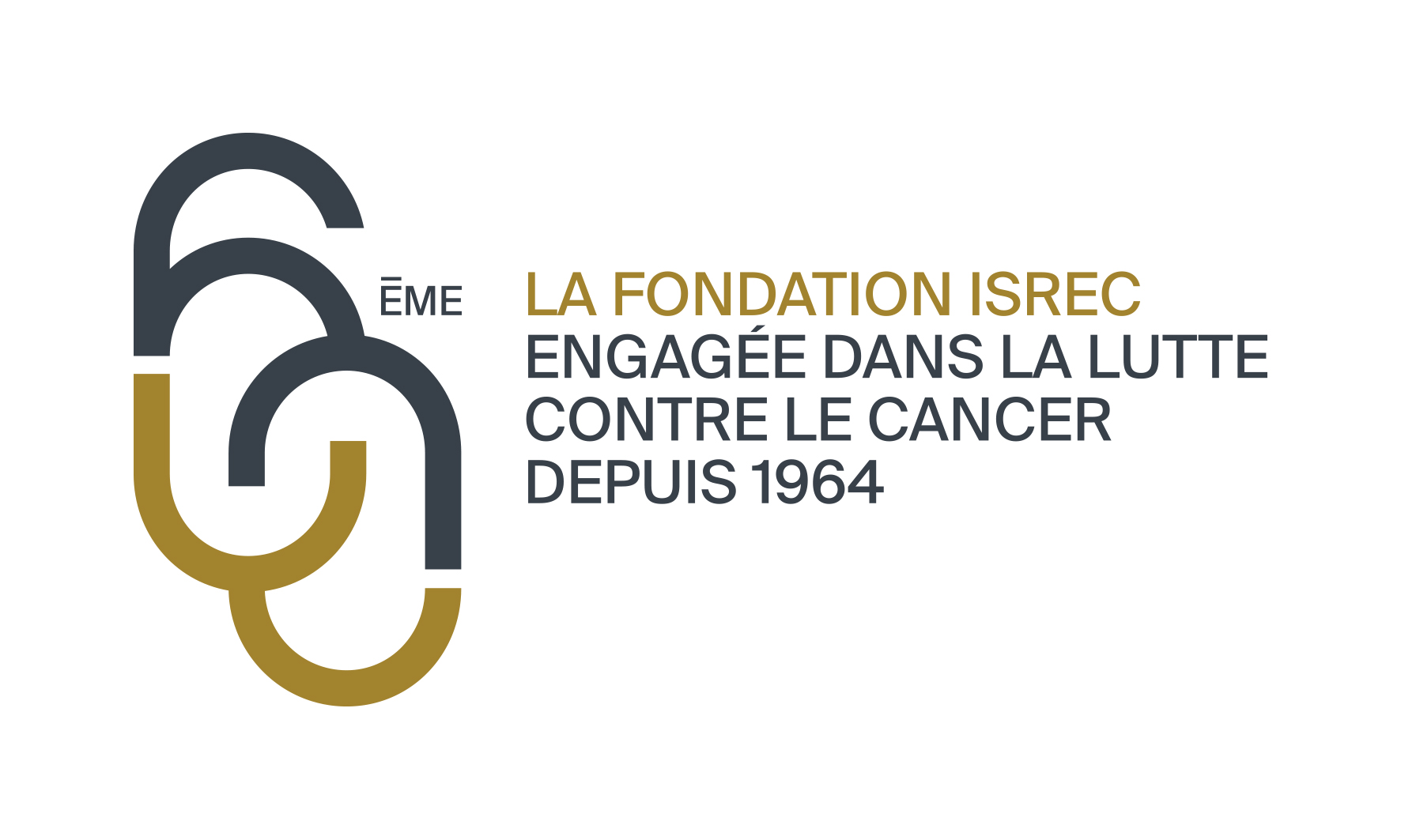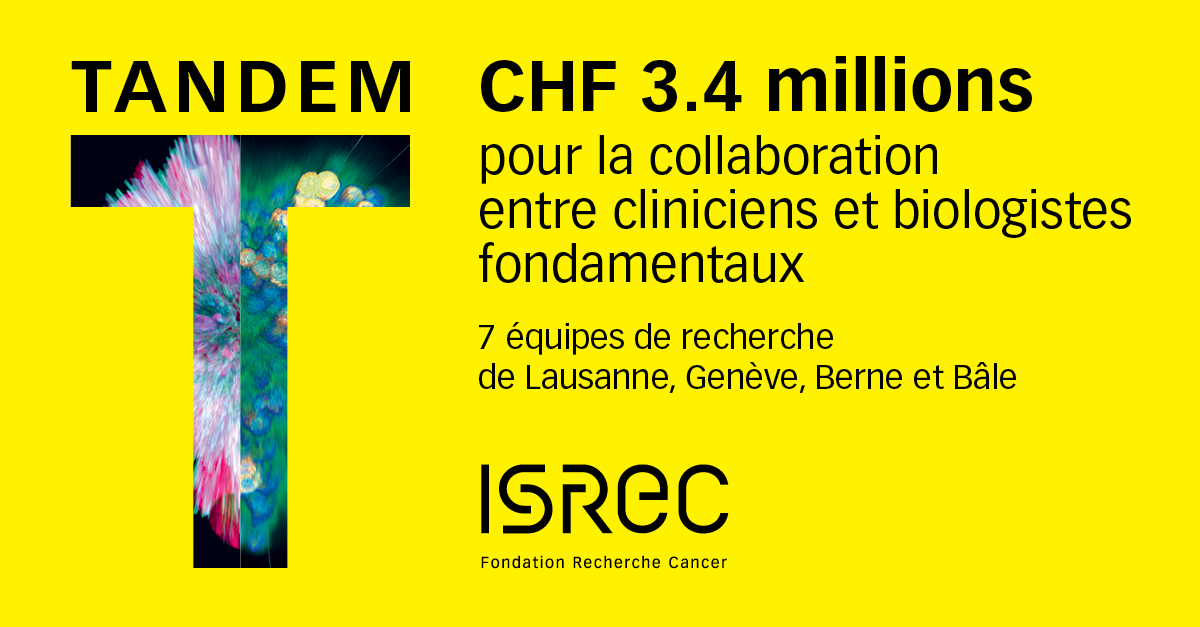To mark the 60th anniversary of the ISREC Foundation, don’t miss our public lecture on Wednesday 5 February 2025, to be held at AGORA from 6pm, with the participation of Prof. Curzio Rüegg.
Looking back on 60 years of history
To mark the Foundation’s anniversary, we reviewed six decades of research and commitment in the interest of innovation in oncology.
Many thanks to Prof. Johanna Joyce, Prof. Denis Migliorini and Prof. Raphaël Gottardo for their fascinating talks, in which they recounted the history of cancer research, described groundbreaking discoveries and revealed the potential of digital health for the future.

This event also offered the opportunity to honor the TANDEM 2024 grant awardees. Congratulations to these brilliant scientists whose talent and determination bring hope to cancer research.
THANK YOU to the researchers who, with passion and perseverance, turn every challenge into on opportunity for progress.
THANK YOU to ourloyal donors who keep this adventure going as strongly and as enthusiastically as ever.
THANK YOU to all who have turned the past 60 years into an incredible, shared adventure.

This year, seven research groups from Lausanne, Geneva, Bern and Basel have been awarded TANDEM funding.
Each team, consisting of a clinician and a basic research scientist, will address a question of direct clinical relevance from two angles: that of understanding the molecular mechanisms involved and that of directly improving cancer patient care.
Prof. Andreas Holbro & Prof. Lukas Jeker (USB & UNIBAS)
Toward a CD33-directed Shielded Cell/Immunotherapy Pair First-in-Human clinical trial for Acute Myeloid Leukemia
This project pursues preliminary research for a first-in-human clinical trial for the use of CD33-directed CAR-T in acute myeloid leukemia (AML). The goal is to render this CAR-T therapy safer and more effective by eliminating the off-tumor impact of the therapy by protecting hematopoietic stem cells through the expression of an epitope-edited cell surface marker, CD33.
Dr. Thibaud Koessler & Prof. Tatiana Petrova (HUG & UNIL)
Harnessing normal organ chemo-injury response to prevent colorectal cancer metastasis
The theme here is metabolites and cancer. The applicants present preliminary evidence that chemotherapy can induce a “memory” effect in colorectal cancer (CRC). They will examine how the release of a host microbiome-derived metabolites reprograms immune cells in the metastasis niche to inhibit metastatic growth of a cancer.
Prof. Mohamed Bentires Alj & Prof. Walter Weber (USB & UNIBAS)
Immune mapping of tumor draining lymph nodes to predict therapy response and optimize immunotherapy-based combinations in hormone receptor positive breast cancer
This project will characterize immunological parameters in tumor-draining lymph nodes, to see if they can be used as predictive biomarkers for immune-therapy response in HR+/Her2- breast cancer patients.
Dr. Antonia Digklia & Dr. Melita Irving (CHUV & UNIL)
Combination TKI and next-generation CAR T cells for personalized sarcoma therapy
This project will address the limitations of current sarcoma treatments with a multidisciplinary approach (clinical, biological, protein engineering) that aims to develop and optimize CAR T cells for sarcoma in combination with tyrosine kinase inhibitors or other drugs.
Prof. Ren-Wang Peng, Prof. Adrian Ochsenbein & Dr. Sabine Schmid (UNIBE & INSEL)
Rational development of predictive biomarkers and combination regimens for precision immunotherapy in malignant pleural mesothelioma
This project will discover targets and mechanisms of resistance to immune checkpoint blockade therapies in patients with mesothelioma, a dreadful cancer of unmet therapeutic need.
Dr. Laurent Derré & Dr. Ilaria Lucca (UNIL & CHUV)
Unravelling the transcriptomic landscape of Vδ2 T cells in bladder cancer patients
This team will do a single cell transcriptomics study of the roles of Vδ2 T cells both in bladder cancer cells and in the peripheral blood, to find useful molecular signatures that can be correlated with therapy outcome.
Prof. Michal Bassani-Sternberg & Prof. Jean Perentes (UNIL & CHUV)
Evaluation of the neoantigen specific T cell response in pleural carcinosis managed by Pressurized IntraThoracic Hyperthermic Aerosol cisplatin Chemotherapy (PITHAC)
This project aims to analyze neoantigens and the antigenic landscape in general of patients diagnosed with pleural carcinosis (lung cavity) tumors undergoing treatment with PITHAC (or pressurized intrathoracic chemotherapy distribution with moderate hyperthermia). The outcome of this study may facilitate the integration of PITHAC with immune checkpoint blockade treatments.
Research for the benefit of cancer patients:
Each year, World Cancer Day offers the opportunity to promote worldwide awareness for this disease.
The fight against cancer involves various strategies: awareness raising, information, prevention, but also research.
For 60 years, the ISREC Foundation has been supporting cutting-edge research aimed at developing effective treatments for this disease.
- In Switzerland, 45’000 new cases are diagnosed each year
- 68 % of all patients are still alive 5 years after diagnosis
- 17’000 people die of cancer each year

